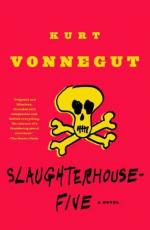|
|
Slaughterhouse-Five Author/Context
"The nature of his talent has been to realize just how strong the human imagination is; that no matter how pessimistic the conditions of the world may be, man still possesses the right to create his own reality." - Jerome Klinkowitz, on Kurt Vonnegut
Kurt Vonnegut was born in Indianapolis, Indiana, on November 22, 1922, the third child of two middle-class parents. His father was an architect and his mother came from a socially prominent family. He grew up during the Great Depression, and saw his life transformed as his family lost much of its money. Vonnegut has said that his greatest cultural debts are to the comedians, such as Laurel and Hardy, Buster Keaton, Jack Benny, and Charlie Chaplin, who kept him laughing even during the Great Depression.
He worked on both his high school and college newspapers, and in 1943 enlisted in the United States Army. He went to Cornell University. His father told him to study something useful, so he studied chemistry and biology. He was sent to war when a bout with pneumonia during his junior year cost him his draft deferrment. In 1944, when he was home on leave, his mother committed suicide with an overdose of sleeping pills. On December 22, 1944, Germans captured him at the Battle of the Bulge and he was a prisoner of war in Dresden, Germany, where he worked in a malt-syrup factory. In 1945, he experienced the Allied firebombing of Dresden, which killed between 135,000 and 250,000 civilians, even more than the U.S. dropping the atomic bomb on Hiroshima and Nagasaki.
After the war, he worked for the Chicago News Bureau and studied Anthropology at the University of Chicago but did not gain his Master of Arts degree until 1971, when the department of Anthropology decided that his novel Cat's Cradle could serve as a thesis. His rejected thesis proposals included a comparative study of revolutionary groups such as French Cubists and the American Plains Indians Ghost Dance movement, and another, a comparative study of the structure of the folktales of Russia, Kentucky, and other regions. His familiarity with story structure through the research for this proposal gave him an understanding of short stories, and he began writing and selling them to magazines such as Colliers and The Saturday Evening Post. At the same time, he worked in public relations for General Electric for several years but then quit and moved, with his wife and children, to Massachusetts to write full-time. His first five novels and his books of short stories (Player Piano, 1952; The Sirens of Titan, 1959; Canary in a Cat House (stories), 1961; Mother Night, 1962; God Bless You, Mr. Rosewater, 1965; and Welcome to the Monkey House (stories), 1968) did not gain widespread critical recognition. In 1965, when started a teaching position at the Iowa Writer's workshop, his career could not have been in worse shape. Many of the magazines which published him had become defunct, and he was only receiving publication in small science-fiction magazines. However, that year, two publishers decided to reissue his previous novels, and the American public finally began to see that he was not a science-fiction writer but a serious writer who had a firm, if humorous grasp on middle-class American society. In 1968, he received a Guggenheim fellowship to return to Dresden.
It was Slaughterhouse-Five which really put him on the map. The review was given the coveted and prestigious first page of the New York Times Book Review, and a personality piece followed on the next page. It had taken him nearly twenty years to be able to write about the massacre in Dresden, but the novel is known as one of great anti-war novels of our time. Critic Gerome Hicks wrote of Slaughterhouse-Five that the real Kurt Vonnegut "lives and breathes in the book, and that this is one reason why it is the best he has written."
Kurt Vonnegut has since written eight novels, including Breakfast of Champions, two plays, several collected works of fiction and non-fiction, a requiem, and many, many uncollected works of fiction and nonfiction, including articles, interviews, and speeches. He is one of the most unique and well-known American writers of the twentieth century, known as both a humorist and a humanist, always reminding us with a reassuring irony not to give up on the human race.
Bibliography
Klinkowitz, Jerome. Slaughterhouse Five: Reforming the Novel and the World. Boston: Twayne Publishers, Inc. 1990
Klinkowitz, Jerome. Vonnegut in Fact: The Public Spokesmanship of Personal Fiction. Columbia: University of South Carolina Press, 1998.
Klinkowitz, Jerome and Donald L. Lawler. Vonnegut in America. New York: Delacorte Press, 1977.
Vonnegut, Kurt. Slaughterhouse-Five. New York: Dell, 1969.




